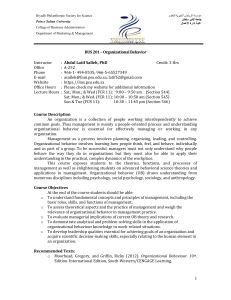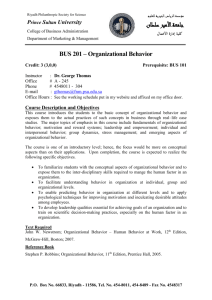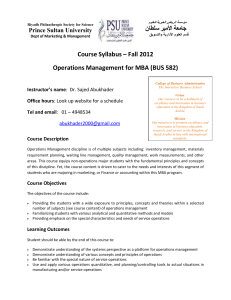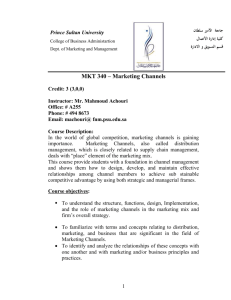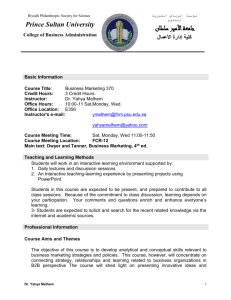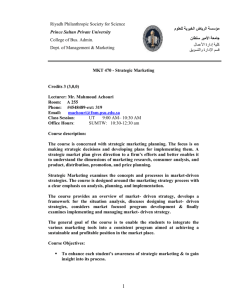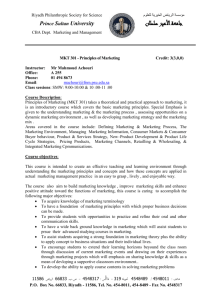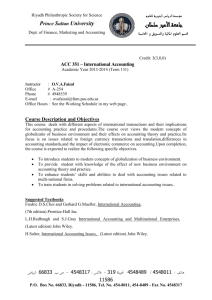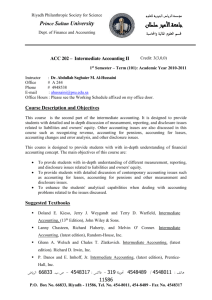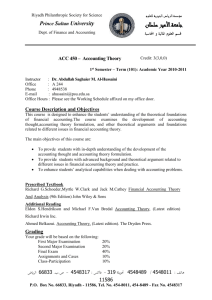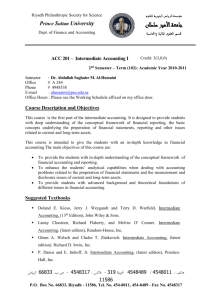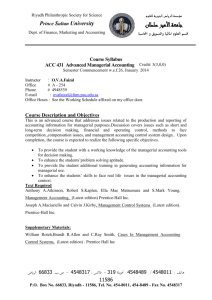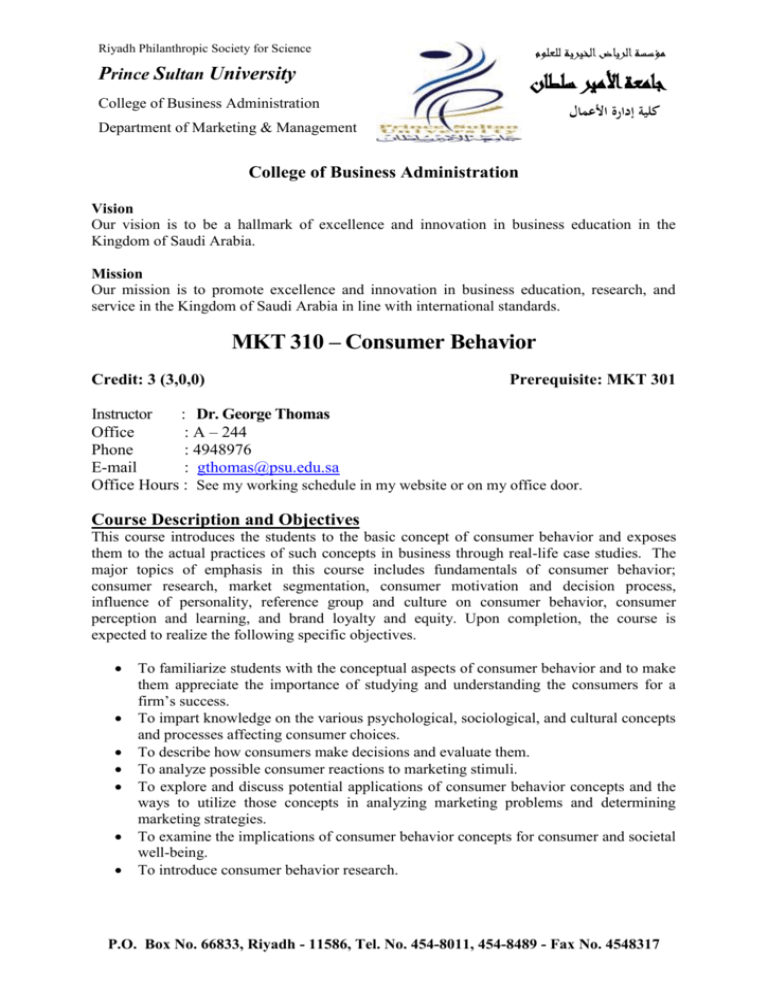
مؤسسة الرياض الخيرية للعلوم
Riyadh Philanthropic Society for Science
جامعة األمير سلطان
Prince Sultan University
College of Business Administration
كلية إدارة األعمال
Department of Marketing & Management
College of Business Administration
Vision
Our vision is to be a hallmark of excellence and innovation in business education in the
Kingdom of Saudi Arabia.
Mission
Our mission is to promote excellence and innovation in business education, research, and
service in the Kingdom of Saudi Arabia in line with international standards.
MKT 310 – Consumer Behavior
Credit: 3 (3,0,0)
Prerequisite: MKT 301
Instructor
: Dr. George Thomas
Office
: A – 244
Phone
: 4948976
E-mail
: gthomas@psu.edu.sa
Office Hours : See my working schedule in my website or on my office door.
Course Description and Objectives
This course introduces the students to the basic concept of consumer behavior and exposes
them to the actual practices of such concepts in business through real-life case studies. The
major topics of emphasis in this course includes fundamentals of consumer behavior;
consumer research, market segmentation, consumer motivation and decision process,
influence of personality, reference group and culture on consumer behavior, consumer
perception and learning, and brand loyalty and equity. Upon completion, the course is
expected to realize the following specific objectives.
To familiarize students with the conceptual aspects of consumer behavior and to make
them appreciate the importance of studying and understanding the consumers for a
firm’s success.
To impart knowledge on the various psychological, sociological, and cultural concepts
and processes affecting consumer choices.
To describe how consumers make decisions and evaluate them.
To analyze possible consumer reactions to marketing stimuli.
To explore and discuss potential applications of consumer behavior concepts and the
ways to utilize those concepts in analyzing marketing problems and determining
marketing strategies.
To examine the implications of consumer behavior concepts for consumer and societal
well-being.
To introduce consumer behavior research.
P.O. Box No. 66833, Riyadh - 11586, Tel. No. 454-8011, 454-8489 - Fax No. 4548317
Riyadh Philanthropic Society for Science
Prince Sultan University
College of Business Administration
مؤسسة الرياض الخيرية للعلوم
جامعة األمير سلطان
Department of Marketing & Management
كلية إدارة األعمال
Textbook Required
Leon Schiffman, and Leslie Kanuk; Consumer Behavior, 10th Edition; Pearson, Prentice Hall;
2010.
Reference Book
Michael Solomon, Consumer Behavior, 9th Edition, Prentice Hall; 2011.
Grading*
Your grade will be based on the following:
First Major Exam
15%
Second Major Exam
20%
Final Exam
40%
Assignments & Case studies 15%
Class-Participation
10%
*The course teacher reserves the right to alter this distribution without prior notice.
Class participation means making meaningful contributions and showing evidence of
preparation during the discussion of the issues in the class. You may be a proficient problem
solver but if you are unable to communicate with your peers about possible solutions, your
abilities will never become apparent, either in this class or in any other setting. On the other
hand, even if you are very good at communication, you must be able to back up your
assertions with reliable evidence and logic. Having the wrong numbers or an incorrect
analysis may not be detrimental to your grade if you have reasonable support for your
assertions. Half of the class-participation marks would be awarded, based on your attendance
level, as follows.
Number of
Score awarded
Number of
Score awarded
Absences
Absences
3 or less
5.0 / 5.0
7
2.5 / 5.0
4
4.5 / 5.0
8
1.0 / 5.0
5
4.0 / 5.0
9
DN or Zero
6
3.5 / 5.0
During the semester, you will be given few assignments, projects and case studies. They
together will count for 15% of your final grade. The purpose of the assignments and projects
is not only to broaden your understanding on the specific topic but also to familiarize you
with the literature on marketing. Besides, this will help you to practice for the exams.
Case studies, of late, have become an indispensable tool of business management learning. It
is, rather, impractical for a business management teacher to put his students into real world
business situations and teach them. Hence, case studies are increasingly resorted to bring the
real world business situation into a classroom setting. A case material would present you a
real world business experience condensed into manageable information of relevance in an
assumed decision context. Based on the material, you will be asked to do homework to
identify and state the problem with specificity, list out the alternatives available to solve the
P.O. Box No. 66833, Riyadh - 11586, Tel. No. 454-8011, 454-8489 - Fax No. 4548317
مؤسسة الرياض الخيرية للعلوم
Riyadh Philanthropic Society for Science
جامعة األمير سلطان
Prince Sultan University
College of Business Administration
Department of Marketing & Management
كلية إدارة األعمال
problem, weigh the alternatives, and pick the appropriate one in the decision context. That
will be further discussed in the class to sharpen your decision-making skill. Also, it may
enable you to identify and appreciate the areas in which your knowledge on marketing could
be applied into. The deadline given for the assignments and case studies should be strictly
adhered to.
The major and final examinations will follow the normal college pattern. However, the
exams will have some focus on testing your ability to transform the theoretical understanding
into practical settings.
DN Policy
Any student, who earns 9 absences, will be recommended for DN. The absences will be
counted from the day first of the official start of classes given in the semester calendar, no
matter when the student has actually registered the course. Besides, any student who is late
by more than five minutes after the scheduled start of a class will be marked absent, and such
absences will also be counted for DN purpose.
Indicative Course Contents
Contents
Week 1
Chapter 1
Introduction to consumer behavior
Basic concepts of marketing in relation to consumer behavior
Digital technologies on marketing strategies
A model of consumer decision making
Week 2
Chapter 2
Consumer research
Consumer research paradigms
Consumer research process
Ethics in consumer research
Week 3
Chapter 3
Market segmentation
Bases for segmentation
Criteria for effective targeting of market segments
Implementing segmentation strategies
Project-I
P.O. Box No. 66833, Riyadh - 11586, Tel. No. 454-8011, 454-8489 - Fax No. 4548317
Riyadh Philanthropic Society for Science
Prince Sultan University
College of Business Administration
مؤسسة الرياض الخيرية للعلوم
جامعة األمير سلطان
Department of Marketing & Management
كلية إدارة األعمال
Week 4
Chapter 4
Consumer motivation - needs, goals, and motives
The dynamics of motivation
Types and systems of needs
The measurement of motives
Major Exam -1
Week 5
Chapter 5
Personality and consumer behavior
Theories of personality
Personality and consumer diversity
Consumer ethnocentrism, brand personality, self-image etc.
Week 6
Chapter 6
Consumer perception
Dynamics of perception in consumer behavior
Consumer imagery
Perceived risk
Week 7
Chapter 7
The consumer learning
Theories of consumer learning
Measures of consumer learning
Week 8
Chapter 8
Attitude and structural models of attitude
Attitude formation in consumers
Strategies for changing consumer attitudes
Cognitive dissonance and attribution
Week 9
Chapter 9
Communication and consumer behavior
Persuasive communication strategy
Elements of message presentation
Major Exam - 2
Week 10
Refer Additional materials given
Reference groups on consumer behavior
Types of reference groups and forms of reference group appeals
Family as a reference group
P.O. Box No. 66833, Riyadh - 11586, Tel. No. 454-8011, 454-8489 - Fax No. 4548317
Riyadh Philanthropic Society for Science
Prince Sultan University
College of Business Administration
Department of Marketing & Management
مؤسسة الرياض الخيرية للعلوم
جامعة األمير سلطان
كلية إدارة األعمال
Project II
Week 11
Chapter 10
Social class and consumer behavior
Social mobility and geodemographic
Selected consumer behavior applications of social class
Week 12
Chapters 11 & 12
Culture and consumer behavior
Measurement of culture
Subculture and consumer behavior
Types of subcultures
Week 13
Chapters 12 & 13
Types of subcultures (continued)
Cross-cultural consumer behavior
Alternative multinational strategies
Cross-cultural psychographic segmentation
Week 14
Chapter 14
Diffusion of innovation process
Consumer adoption process
Opinion leadership and its dynamics
Measurement techniques for opinion leadership
Week 15
Chapter 15
Consumer decision making
Four views of consumer decision making
A models of consumer decision making
Relationship marketing
Final examination
Special Note:
The course teacher reserves the right to modify any part of this course outline/syllabus during
the course of the semester. If any such modification is made, it will be intimated to the
students by posting it in the homepage and/or through classroom announcement.
P.O. Box No. 66833, Riyadh - 11586, Tel. No. 454-8011, 454-8489 - Fax No. 4548317

